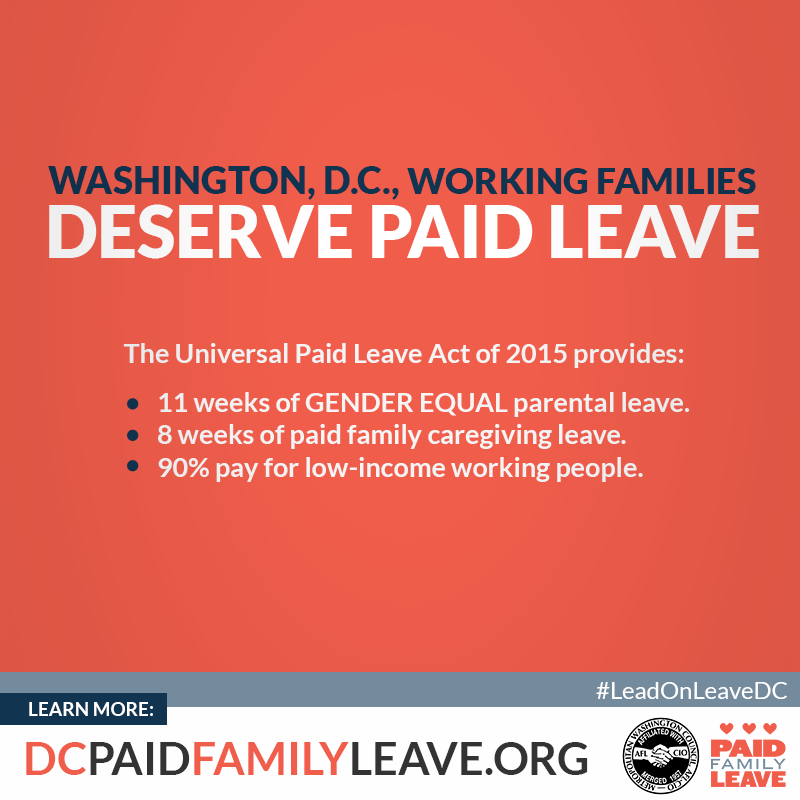
"I sometimes imagine how my life would be different if my mom had the option of paid family leave," Travis said. The District of Columbia resident was born prematurely. Because his mother could not get the time off from work to make necessary hospital visits to care for her fragile son, "She had to give me up to be raised in Florida by other family members."
Travis and his fellow Washington, D.C., residents may no longer face those wrenching choices, thanks to the Universal Paid Leave Act, a proposed paid-leave law introduced this past Tuesday in the D.C. City Council. Among the most progressive of such paid-leave laws in the nation, the employer-paid leave program includes 11 weeks of gender equal parental leave, eight weeks of paid family caregiving leave and up to 90% pay replacement for low-income workers on leave. Family leave includes parental leave for new parents after the birth, adoption or fostering of a child, as well as caregiving leave to care for a sick, injured or dying loved one.
"58% of D.C. families can't afford to take unpaid leave," said Jackie Jeter, president of the Metropolitan Washington Council AFL-CIO, which worked with a coalition of paid-leave advocates to shepherd the bill through the legislative process over the past year. The D.C. Paid Family Leave Coalition, a network of nearly 200 businesses, nonprofits and advocacy organizations, said it was "extremely pleased to see the council affirm the need for paid family leave and move toward creating a program that works for everyone," but called for strengthening the bill. Initial drafts included medical leave, available for people who suffer serious injuries or illnesses and need time away from work to recover.
“While council members finalize the details around paid leave legislation, they have a moral obligation to include medical leave coverage for a large portion of our city's most vulnerable working people and families,” said Jaime Contreras, vice president of SEIU 32BJ, a steering committee member of the D.C. Paid Family Leave campaign. "Paid medical leave is especially urgent for our members and others in D.C. who earn low wages, as only 17% of low-wage workers nationally have access to short-term disability plans (aka paid medical leave). At a time when the Affordable Care Act is under threat and when medical expenses are the leading cause of personal bankruptcy, working families are relying on their council members to create a program that helps their families stay financially stable during health crises."
"I'm currently six months pregnant with my first child and am worried and nervous about the time when I can no longer work," said Ward 8 resident Nicole earlier this year. "I won't be able to pay bills or rent. I have never had to be on public assistance and do not want to rely on that. I'm a hard worker and always have been. Even though, I've been with my restaurant job for a year and a half, any time I need off of work will be unpaid."
Under the proposed legislation, about 65% of Washington, D.C., residents who work would be covered—supporting hundreds of thousands of family members. The remaining 35% work for the District or federal government, or commute outside the city. Of those covered, 100% will be able to afford leave, advocates say. Paid family leave is more critical than ever because 59% of mothers with infants are now in the workforce, while just 12% of private-sector workers get paid leave through their employers. Studies show that when a parent can take time away from work to care for a child after birth or adoption, it results in improved health for both.
The law's cost will be covered by a 0.62% increase in employer-paid payroll taxes, which bill sponsor At-Large Council Member David Grosso called "a pretty good deal," noting that it will enable District residents "to do what matters most to them in life and that is be close to the people they care about during great moments of transition in their lives." At the same time, the D.C. Paid Family Leave Coalition is calling for a return to the 1% tax initially proposed, which would enable the city to offer medical as well as family leave.

